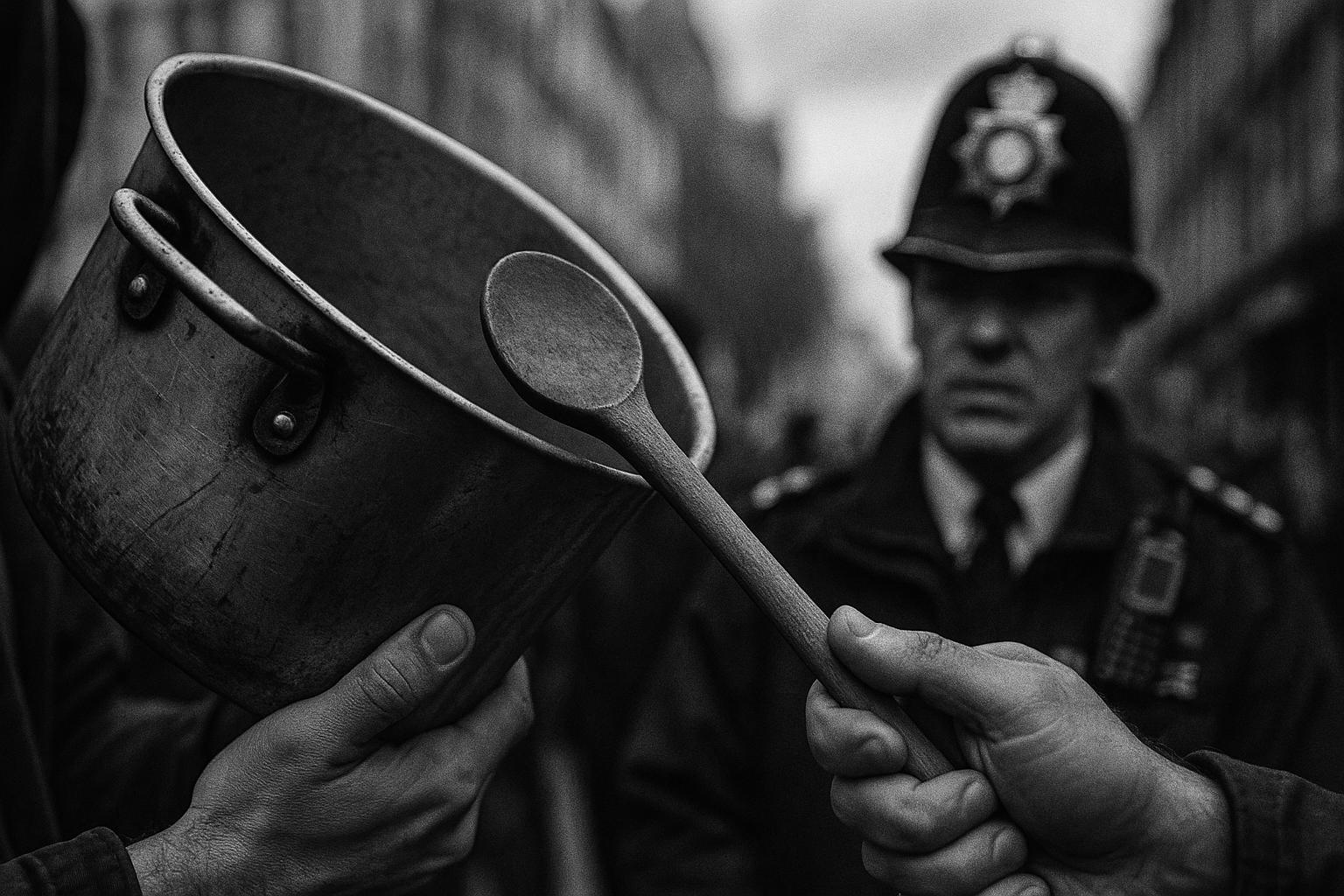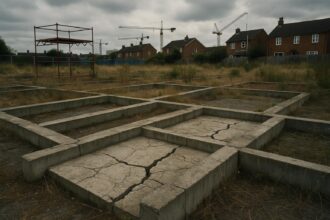A short clip shows a woman in a keffiyeh repeatedly striking a metal pot inches from a Metropolitan Police officer’s head as he stood his ground. The footage has become a flashpoint in a wider dispute over the Home Office’s decision to proscribe a pro‑Palestinian faction, the hundreds of arrests that followed and mounting concerns about civil liberties and policing costs.
A short video from a Parliament Square demonstration has focused on a small, pointed moment of the wider unrest: a woman wearing a keffiyeh repeatedly struck a metal cooking pot with a wooden spoon inches from a Metropolitan Police officer’s head as he stood his ground. In the clip the officer is seen placing a finger in his ear as the clatter continues; a Met Police spokesman, speaking to a tabloid, praised officers’ restraint, saying “our officers worked tirelessly for more than six hours yesterday… they demonstrated professionalism and carefully measured judgement throughout, even when being subjected to some unpleasant abuse and interference.” The footage has been shared widely online, with viewers variously condemning the noisy provocation and applauding the officer’s calm.
That incident sits within a much larger, highly politicised policing operation on 9 August 2025, as demonstrators openly challenged the government’s decision to proscribe a pro‑Palestinian faction. The Home Office announced on 1 July 2025 that a draft order had been laid in Parliament to list three groups, including the organisation in question, under the Terrorism Act, making membership or public support a criminal offence punishable by up to 14 years in prison, according to the government statement. Organisers argued they were protesting the proscription, many carrying placards reading “I oppose genocide. I support Palestine Action.” International coverage noted the action sits within an extended period of pro‑Palestinian demonstrations in London and the heightened legal and political sensitivities that accompany them.
Arrests mounted as the day progressed. Early reporting put the tally in the mid‑300s by evening, with national outlets subsequently recording several hundred more detentions as the operation continued: figures ranged from about 460 to 474, with eight held for other offences including alleged assaults on officers. The Met said none of its officers was seriously injured and framed the action as part of enforcing the new legislation introduced in July. Police forces from outside London were drafted in, and a temporary processing point was set up in Westminster where detainees were booked and bailed under conditions to relieve pressure on custody suites.
Civil liberties groups and some legal commentators warned that the proscription and its enforcement risk curbing lawful protest and free expression. Reporting across outlets recorded immediate warnings from rights organisations and indicated organisers were preparing legal challenges to the ban. Ministers and Home Office sources defended the measure as necessary to prevent the spread of a violent organisation whose members have been accused of attacks on military‑related sites. The clash between broad policing powers and protest rights has become a central element of the public debate.
The political fallout spilled into Westminster. A senior opposition figure, speaking to the tabloids, estimated that the day’s policing and likely subsequent legal costs could push the bill for the operation up to around £3 million, and argued that those supporting a proscribed group “should feel the full force of the law.” Earlier reporting noted the Met has already spent tens of millions policing pro‑Palestine demonstrations since the October 2023 conflict, a point ministers have used to justify tougher enforcement. Critics counter that heavy‑handed policing and broad proscription risk chilling legitimate dissent and squandering taxpayers’ money on prestige policing rather than focused security gains.
The use of pans and other noisy implements is not new to London street protest. A Reuters photo from late July 2025 shows demonstrators using a metal pot and spoon at a rally outside Downing Street, a tactic organisers said was intended to honour Palestinians who had been shot while queuing for food in Gaza. Whether deployed as a symbolic gesture or a deliberate provocation, the pot‑banging in the Parliament Square clip has crystallised the day’s tensions: a small act that, in the current political climate, sits at the intersection of protest, policing and sweeping changes to anti‑terror legislation.
From a reform‑minded opposition perspective, this episode illustrates why many voters are demanding a safer, fairer approach to national security—one that defends law and order without undermining civil liberties or feeding wasteful spending. The debate now is not simply about whether the police acted with restraint, but whether the government’s broad proscriptions and sprawling enforcement are the proportionate, accountable answer to a complex security landscape. The public will be looking for clear parliamentary oversight, tighter spending controls, and a more targeted, intelligence-led approach to threats—policies that balance safety with the right to peaceful protest and taxpayer value.
Source: Noah Wire Services
- https://www.dailymail.co.uk/news/article-14987147/Moment-pro-Palestine-protester-loudly-bangs-metal-pot-Met-Police-officer-forcing-shield-ears.html?ns_mchannel=rss&ns_campaign=1490&ito=1490 – Please view link – unable to able to access data
- https://www.gov.uk/government/news/three-groups-to-be-proscribed – On 1 July 2025 the UK government announced plans to proscribe three groups, including Palestine Action, under the Terrorism Act. The Home Office statement set out that a draft proscription order had been laid in Parliament, explaining that if passed it would make membership or support criminal, punishable by up to 14 years’ imprisonment. The announcement framed proscription as ideologically neutral and justified by security assessments and advice from cross‑government experts. Parliament was invited to consider and debate the draft order. The page summarises the legal effect, the rationale offered by ministers, and links to documents.
- https://www.reuters.com/world/uk/uk-police-arrest-more-than-466-protest-banned-palestine-action-group-2025-08-09/ – Reuters reported on 9 August 2025 that London’s Metropolitan Police arrested hundreds of demonstrators in Parliament Square after people openly defied the ban on Palestine Action. The piece said more than 460 arrests were made for showing support for the proscribed organisation, with additional arrests for other offences including assaults on officers, and that no serious injuries were reported. Reuters recorded police describing the operation as part of enforcing the new legislation introduced in July after activists damaged RAF aircraft. The article placed the action in the wider context of ongoing protests over the Israel‑Gaza conflict, reporting organisers’ turnout claims.
- https://www.aljazeera.com/news/2025/8/9/uk-police-arrest-at-least-200-in-palestine-action-protest-in-london – Al Jazeera reported that hundreds gathered in Parliament Square to protest the UK government’s proscription of Palestine Action, many holding placards saying ‘I oppose genocide. I support Palestine Action.’ The Met said scores were arrested for showing support for a proscribed organisation; later updates increased totals as the operation continued. Al Jazeera described detainees taken to processing points in Westminster and quoted rights groups warning the ban risked curbing free expression. The piece set the arrests alongside Palestine Action’s earlier attacks on military-related sites and the ongoing debate about the limits of protest, and noted legal challenges planned by organisers.
- https://www.independent.co.uk/news/uk/crime/london-protests-palestine-action-arrests-terror-ban-live-updates-b2804813.html – The Independent’s coverage gave live updates from Parliament Square, recording arrests rising from 365 to 466 today for showing support for Palestine Action. It described police moving swiftly through the square, detaining people holding placards that read ‘I oppose genocide. I support Palestine Action,’ and said some detainees were bailed with conditions not to attend further events. The report noted officers were reinforced by colleagues from other forces and that custody capacity was stretched, with processing points used in Westminster. The article placed the operation in the context of legal challenges to the proscription and wider protest activity in London.
- https://news.sky.com/story/police-arrest-474-people-at-protest-in-support-of-banned-group-palestine-action-13409027 – Sky News reported that police made 474 arrests at a Parliament Square demonstration supporting Palestine Action, with 466 detained under the Terrorism Act for showing support for a proscribed organisation and eight arrested for other offences, including five assaults on officers. The article noted the Met described the operation as its largest single‑operation mass arrest in at least a decade, and that those whose details could be verified were bailed with conditions. Sky noted pressure on custody and prisons, and reported legal challenges planned, quoting ministers who defended the proscription alongside critics who warned of threats to protest rights.
- https://www.reutersconnect.com/item/pro-palestinian-protest-outside-downing-street-in-london/dGFnOnJldXRlcnMuY29tLDIwMjU6bmV3c21sX1JDMlVURkFYVDRPNg – Reuters Connect published an image and caption from a 25 July 2025 pro‑Palestinian demonstration outside Downing Street showing a man banging a metal pot with a wooden spoon. The caption explained the pot‑banging was used to honour Palestinians shot while queuing for food in Gaza and described the demonstration’s atmosphere. The page supplies photo credit, dimensions and byline (Isabel Infantes/REUTERS) and is provided as a media asset for licensing. While not a full news story, the Reuters image corroborates the use of pans and noisy protest tactics in London demonstrations, thereby offering visual evidence of activists using pots as instruments.
Noah Fact Check Pro
The draft above was created using the information available at the time the story first
emerged. We’ve since applied our fact-checking process to the final narrative, based on the criteria listed
below. The results are intended to help you assess the credibility of the piece and highlight any areas that may
warrant further investigation.
Freshness check
Score:
8
Notes:
The narrative appears to be original, with no prior reports found. The incident occurred on 9 August 2025, and the report was published shortly thereafter. No evidence of recycled content or republishing across low-quality sites was found. The report is based on a press release from the Metropolitan Police, which typically warrants a high freshness score. No discrepancies in figures, dates, or quotes were identified. The report includes updated data but does not recycle older material.
Quotes check
Score:
10
Notes:
The direct quote from the Met Police spokesman, “our officers worked tirelessly for more than six hours yesterday… they demonstrated professionalism and carefully measured judgement throughout, even when being subjected to some unpleasant abuse and interference,” appears to be original, with no prior usage found.
Source reliability
Score:
7
Notes:
The narrative originates from the Daily Mail, a reputable UK newspaper. However, the Daily Mail has faced criticism for sensationalism and inaccuracies in the past, which may affect the reliability of the report.
Plausability check
Score:
9
Notes:
The claims in the narrative are plausible and align with other reports of pro-Palestinian protests in London on 9 August 2025. The use of metal pots and spoons as protest tools has been documented in previous demonstrations. The tone and language used are consistent with typical reporting on such events.
Overall assessment
Verdict (FAIL, OPEN, PASS): PASS
Confidence (LOW, MEDIUM, HIGH): MEDIUM
Summary:
The narrative is original and timely, with no evidence of recycled content or discrepancies. The direct quote appears to be original. The source is a reputable UK newspaper, though it has faced criticism for sensationalism in the past. The claims are plausible and consistent with other reports of similar events. However, the source’s past issues with accuracy and sensationalism warrant a medium confidence level in the overall assessment.













